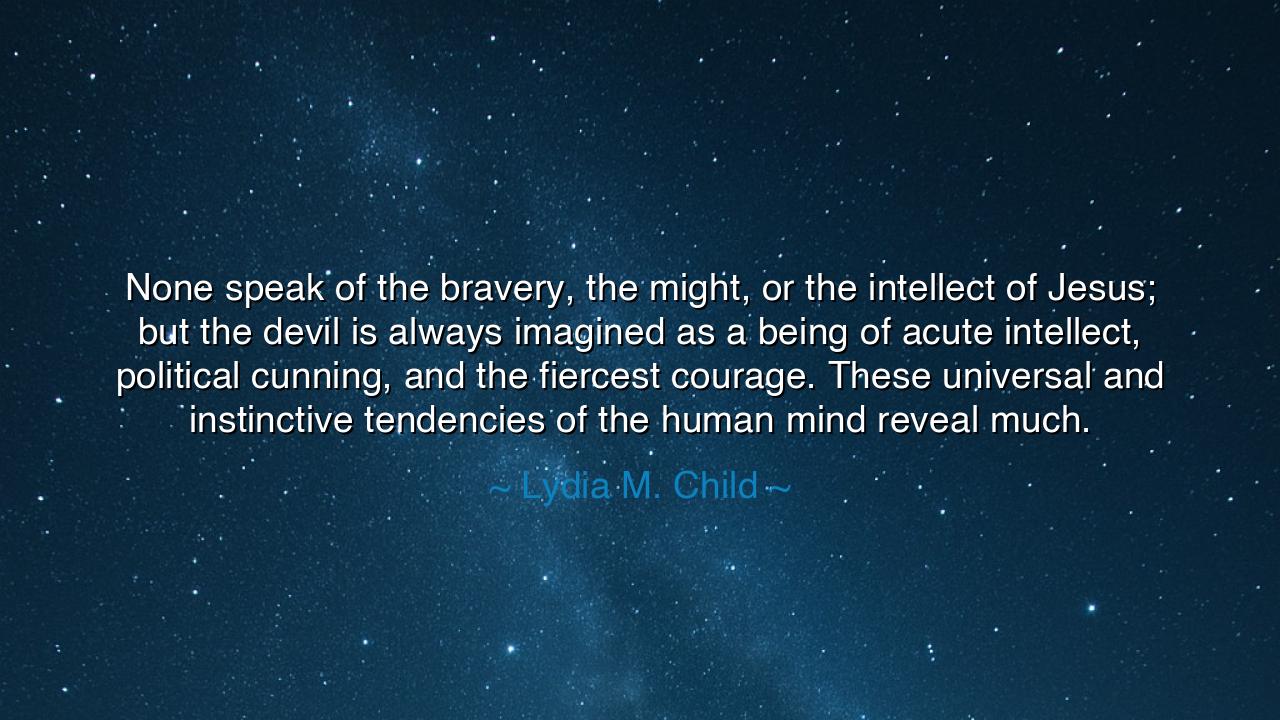
None speak of the bravery, the might, or the intellect of Jesus;
None speak of the bravery, the might, or the intellect of Jesus; but the devil is always imagined as a being of acute intellect, political cunning, and the fiercest courage. These universal and instinctive tendencies of the human mind reveal much.






When Lydia Maria Child, the abolitionist, philosopher, and poet, wrote, “None speak of the bravery, the might, or the intellect of Jesus; but the devil is always imagined as a being of acute intellect, political cunning, and the fiercest courage. These universal and instinctive tendencies of the human mind reveal much,” she was not merely observing human theology — she was revealing the psychology of humanity itself. Her words unveil a mirror, showing that mankind, in its weakness, often glorifies the qualities of rebellion and power more than those of goodness and humility. We worship might and cunning, even when cloaked in darkness, while overlooking the quiet majesty of virtue, the invisible strength of love, and the divine courage of compassion.
In the eyes of Child, this strange instinct — to ascribe intellect and fierce will to evil, but gentleness and meekness to good — is not a trivial matter. It reveals a flaw, a shadow in the human soul. For people are often drawn to what dazzles rather than what redeems. The world marvels at the serpent’s cleverness but yawns at the lamb’s sacrifice. Yet Christ’s courage, though silent, was greater than that of any warrior; His intellect, though clothed in parable, was more profound than the craftiest diplomat; His power, though hidden in mercy, was mightier than the sword. But humanity, Child suggests, still measures strength by domination, and intelligence by deceit. And so, the devil is remembered as clever, Jesus as kind — and in that error lies the tragedy of human understanding.
To grasp the meaning of this truth, we must look to history, where this tendency is seen again and again. Consider Julius Caesar, who conquered empires through brilliance and ruthlessness, and was deified by men who mistook ambition for greatness. Yet beside him, unheralded in the world’s esteem, stand figures like Francis of Assisi, who renounced riches and lived in peace — a man of greater bravery, for he conquered self rather than nations. The world rarely sings of such courage. For the human heart, still chained by ego, prefers the thunder of victory to the quiet of goodness. Lydia M. Child saw this clearly — that mankind admires the devil’s defiance more than God’s obedience, and in that misplaced admiration lies the seed of its suffering.
But Child was not condemning humanity — she was calling it to awakening. Her insight urges us to reconsider what we call strong, wise, and brave. The true intellect is not that which manipulates others, but that which understands truth; the true courage is not that which conquers through fear, but that which endures through love; the true might is not in power over men, but in mastery over self. Jesus embodied these virtues — not in the noise of conquest, but in the silence of sacrifice. He forgave those who hated Him, stood steadfast before tyrants, and faced death not with rage, but with serenity. Such is courage beyond comprehension — yet it is often dismissed because it does not glitter. Child, therefore, teaches us that the soul must learn to see not with the eyes of the world, but with the eyes of wisdom.
The origin of her quote can be traced to her lifelong struggle for moral truth in a society blinded by prejudice. Living in the nineteenth century, she fought against slavery, injustice, and hypocrisy — not with weapons, but with words and conscience. She witnessed how people praised cunning politicians and powerful masters while scorning the meek and righteous. In her observation of such moral inversion, she saw reflected the same paradox she described: humanity’s instinct to admire the attributes of the devil — ambition, manipulation, dominance — while neglecting the divine virtues of humility and compassion. Her voice rose, then, not in despair but in challenge: to teach that goodness is not weakness, that mercy is not folly, and that divine love is the highest intelligence.
To illustrate her point, one might look to the story of Mahatma Gandhi, who, like Christ, wielded no weapon but truth. Against the vast machinery of the British Empire, he stood armed only with faith, peace, and moral conviction. To the worldly eye, such methods seemed naïve; yet through that gentleness, he broke an empire’s pride. His life was proof that true courage is not ferocity but steadfastness; true intellect is not deception but vision. He embodied the same holy strength that Child exalted — the strength to suffer rather than to sin, to forgive rather than to destroy. His triumph was not of the flesh, but of the spirit — and such victories, though quiet, echo across centuries.
So, my listener, learn from the wisdom of Lydia Maria Child. When the world praises the clever and the cruel, remember that cunning builds empires that crumble, but compassion builds kingdoms that endure. When others mistake humility for weakness, know that it is the highest form of mastery. When the proud glorify the intellect of evil, remind them of the divine intelligence of love, which alone heals what power wounds. For the devil’s brilliance blinds, but Christ’s light awakens.
Thus, if you would truly understand the “tendencies of the human mind,” examine what you admire — for that reveals what you are becoming. Choose, then, not the brilliance of rebellion, but the radiance of righteousness. Let your strength be in kindness, your intellect in truth, your courage in mercy. For in the end, it is not the devil’s cunning that will outlast the ages, but the simple and eternal wisdom of love.






AAdministratorAdministrator
Welcome, honored guests. Please leave a comment, we will respond soon